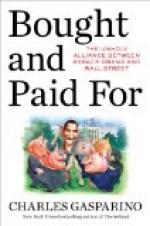“Seated in the centre of the small parlor, before a round table fairly well lighted by an electrolier suspended from the middle of the ceiling and littered with chiffons and laces, Mrs. Blaine stopped sewing and began a laborious search all over the board for the missing article. Finally the scissors were found hidden in the folds of what some day would be a graduation dress, but no sooner were they in use than something else was missing. Impatiently, the widow called out:
“Fanny! I do wish you’d come here. I’ll never get this dress done. Did you see the roll of satin ribbon?”
But Fanny, busy just then with a customer in the outer shop, paid no attention to the summons. Virginia’s new dress could wait—it was a whole month to graduation day anyhow—but business was not so good that one could afford to neglect a possible purchaser.
Four summers had gone by since John Blaine’s death yet in that comparatively brief space of time, his widow appeared to have aged ten years or more. Now bent, infirm, a chronic invalid, she did not look as if she would long survive him. The world goes on just the same no matter whose heart is breaking, and time flies so quickly that the happenings of a decade seem only of yesterday. But John Blaine was not forgotten. The flowers that each week decorated his grave, placed there by loving hands, served to keep fresh the father’s memory.
As far as was possible, the bereaved wife tried to keep to herself the sorrow that had slowly but surely undermined her health and made her an old woman before her hour. In her heart she knew that she would not long remain after the dear departed one; all she asked was that she should live long enough to see her girls happily married and taken care of. At first it had seemed as if existence without him was impossible, yet the regular routine of life must go on. Besides it was not fair to the girls. Her own life was irretrievably wrecked, but theirs had barely begun. It would be selfish to allow her grief to cast a permanent shadow over their young lives. They loved their father very dearly; his death had been a great shock to them. But they were young. They had a thousand outside interests to distract their attention. And youth, with its gaze still turned upward to the stars, soon forgets.
When everything was settled, the widow found herself with a little less than $3,000, all she possessed in the world. To attempt to live on the interest alone of such a slender capital was obviously an impossibility, so it was decided that they would move uptown, where they would not be known, and open a little millinery shop. This was a bright idea that had occurred to Fanny. She had always been clever at trimming hats. Why not put her skill to commercial profit? She and her mother could very well attend to such a business, while Virginia continued in school. If they were only fairly successful, the income would pay expenses, carry them along and help keep their capital intact. Dr. Everett heartily approved the plan, not only because it might prove a source of steady income, but also because it would be distraction for the widow and help her to forget. Mrs. Blaine somewhat reluctantly consented, and the girls set out enthusiastically to look for a shop.




